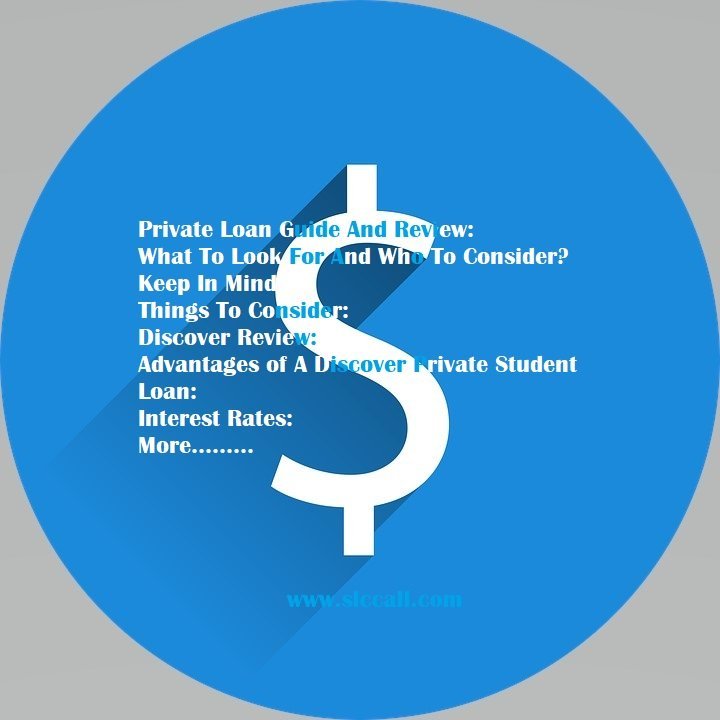Private Loan Guide And Review: What To Look For And Who To Consider
There’s nothing more exciting and invigorating than getting an acceptance letter back from the college you applied to. Your future is on the right track, you’re going to college for something you want to do, and it’ll be some of the fondest memories you’ll have.
Unfortunately, not so long after, a bill for the cost of tuition, books, etc–comes along with it. Getting accepted into a college is one major feat to accomplish, but paying for it, well that’s another mountain climb.
The first place many students turn to first is their trusted FAFSA. You may want to consider borrowing from the government or you can even apply for grants, scholarships, etc.
But when you still have a due balance owed, even after exhausting your federal loans and winning scholarship after scholarship—one place you may want to consider is private loans.
Consolidating private student loans
Keep In Mind
Private loans are one way of paying for college but it’s a whole different ball-game. For starters, if you have bad credit, you’ll definitely need a co-signer or parent to take on the loan with you. The key difference between Federal Student Loans and Private Loan is that you want a good line of credit because you’ll get the best interest rate in return.
You also will have to shop around for the right private loan, as most lenders these days are willing to compete for your business. And it is a business. With so many companies out there vying for your potential loan, it may feel slightly unnerving.
Things To Consider
There are some good programs and plans out there. You will not have the same protections (versatile repayment options, consolidation, flexible time periods, lower interest rate) that you get from the Federal loans.
Read More: Various means and ways of dealing with student loans
Read More: All About consolidation Student Loans
-
-
How flexible is the payment period? How long will the lender allow for a complete repayment? Are there early payment penalties and fees?
-
-
-
Can you file a forbearance or deferment? Some lenders aren’t as sympathetic towards the hardships of borrowers. Make sure you investigate if the lender provides any grace periods.
-
-
-
Interest rates: One of the bigger differences is the interest rate, which can fluctuate from anywhere as low as 3% to 13%. It depends on your credit, co-signer, and lender. Also, if the lender is flexible with interest rates, do your due diligence by looking into their fixed rates. Fixed rates stay the same for the entirety of the loan’s life. This is great because it’s economic proof.
-
-
-
Do they offer rewards? Some companies offer a reduction in the interest rate if you sign up for automatic debit card payment. It may not be a whole lot, but once those monthly payments start kicking in, you’ll appreciate any relief.
-
Read More: Getting An Education But At What Cost And Is It Worth It?
These are just a few questions and things you’ll want to take a closer look at before you go out and sign on the line for a private loan.
With those items on the list and the above in mind. Let’s take a look at one option you may want to consider using for your private student loan.
Discover Review
Discover prides themselves on a few things such as keeping their customer service communication clear and available. They do that by basing all of their loan specialists out of the United States. That’s a major plus right there when it comes to communicating.
You also don’t have to worry about origination and hidden fees. This is a major plus, as even the Federal loans come with 4.26% (Federal Direct Plus) and a 1.06% (Stafford) origination fee.
Discover will also allow you to earn a full 1% cash reward in each student loan for securing a 3.0 G.P.A. or higher. The Feds, Wells Fargo, and Sallie Mae—all reputable loan companies, do not offer those incentives.
You won’t be restricted as far as how much your costs will be covered. Discover covers up to 100% of college or a graduate school cost on materials, books, and tuitions.
Unlike Wells Fargo, Discover allows for more flexible repayment options such as in-school payment or deferment while school. And you can find a loan for just about any higher educational purpose.
-
-
Law students.
-
-
-
Undergraduates.
-
-
-
Graduates.
-
-
-
MBA
-
-
-
Bar Exams
-
-
-
Health Professionals.
-
-
-
Residency.
-
-
-
Consolidation options (private and federal loans)
-
Read More: Student loan forgiveness Program opportunity and advantages
Read More: Student Loan Forgiveness program Plan and Options
According to NerdWallet, the average time of application approval is approximately 14-17 days. This all depends on whether or not the student or parent had all of the appropriate information gathered at the time. Of course, it isn’t uncommon for a student to see an approval even after 15 minutes of filing. The application itself is very easy and quick to complete, and on average, a student spends only 10-15 minutes completing it.
Advantages of A Discover Private Student Loan
As you can there are already a few added reasons for applying for a student loan with Discover.
Here are few more items that you may find appealing:
-
Six month grace period after graduation or leaving school.
-
No FAFSA requirement prior to application.
-
No origination fees.
-
Automated Debit Reward for those who sign up for automatic payments. Get 0.25% interest rate reduction.
-
12-month forbearance.
-
6-month reduction payment program, if you can’t make the payment amount at the time and aren’t more than 60 days delinquent.
-
$25 capped payment while in College. Or you can defer.
The minimum amount you can apply for a Student Loan is $1,000 and Discover let’s you apply for up to the 100% of college cost. They do have a hardship program. Where your monthly payment would basically tail out at what the interest rate would be monthly, $50.
Interest Rates
6.49 %-11.99% Fixed Rate
4.62%-10.62% Variable Rate.
According to the latest figures from Student Loan Hero, Direct Subsidized Loan and Direct Unsubsidized Loans for undergraduates are at 4.45%
So as you can see, there’s not too heavy of a difference between interest rates, while if you shop around you may find a lender with an even lower interest rate than what Discover is offering.
You also have the option of 5-20 years for repayment, with the average ranging at 15 years.
The Final Say About Discover Student Loans
While Discover was rocked by controversy back in 2011 with their student loan scandal, it does appear that they have tried making up for the poor image. By rewarding students of 1% cash reward for a 3.0 G.P.A or higher, flexible payment options, low-interest rates, and the lack of hidden costs and fee—Discover is a viable option to consider in applying for your next private student loan.
Other Options
College Ave
The low variable interest rate at 3.79% and as high as 11.4%. The fixed interest rate is 6.07%-12.66%. You can pay the loan off ranging from 8 to 15 years.
College Ave has loans for grads, undergrads, law students, parents, and professionals. You’ll get up to 100 percent of school costs covered and there are no fees or early payment penalties.
Sallie Mae
No fees or early payment penalties is another appealing reason to look into Sallie Mae for your private student loans. Like Discover, you can sign up for the Auto-Debit program, where you’ll receive a monthly payment reduction.
Sallie Mae has loans for undergrads, grads, parents and many options for dental and medical professionals as well., You get the deferred option while in college, a fixed rate, or you can pay off the interest only. 3.37%-10.33% Variable. 5.74%-11.85% Fixed. 5-15 year payment plan option.
The Closing Words
The options and advice above will surely put you in the right direction in helping you find your next private student loan. As you can see, there is a lot to consider and weigh in. You’ll want to look for a lender who is flexible and easy to work with, but can also offer you the best value for your future money.
Remember, this is a loan you’ll be stuck with for up to 20 years and as little as 5 years. By following the guideline above, and keeping your options open, you’ll find the student loan that makes the most sense for you.
Read more: Student Loan Consolidation 2018: What Is It? Who Can Help You?
 Student loan Forgiveness Call us immediately
Student loan Forgiveness Call us immediately



One comment
Pingback: Understanding Discover Student Loans: A Comprehensive Guide - Student loan Forgiveness